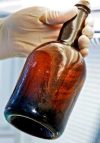ACS News Service Weekly PressPac: March 04, 2015
ACS News Service Weekly PressPac: March 4, 2015
- General Inquiries: Michael Bernstein, 202-872-6042
- Science Inquiries: Katie Cottingham, Ph.D., 301-775-8455
News Items in This Edition
Determining recipes for some of the world’s oldest preserved beers
Some breweries have taken to resurrecting the flavors of ages past. Adventurous beer makers are extrapolating recipes from clues that archeologists have uncovered from old and even ancient brews found at historical sites. Now scientists have analyzed some of...

Energy-generating cloth could replace batteries in wearable devices
From light-up shoes to smart watches, wearable electronics are gaining traction among consumers, but these gadgets’ versatility is still held back by the stiff, short-lived batteries that are required. These limitations, however, could soon be overcome. In the...

Reducing greenhouse gas emissions with a more effective carbon capture method
Trapping carbon dioxide (CO2) emissions from power plants and various industries could play a significant role in reducing greenhouse gas emissions in the future. But current materials that can collect CO2 — from smokestacks, for example — have low...

New insight into a fragile protein linked to cancer and autism
In recent years, scientists have found a surprising a connection between some people with autism and certain cancer patients: They have mutations in the same gene, one that codes for a protein critical for normal cellular health. Now scientists have reported...

How to make palm oil without destroying forests
The versatility of palm oil has led to its use in not just food products but also in everyday goods from lipstick to laundry detergent. But its utility has resulted in the destruction of Southeast Asian rain forests that are the primary source of the oil...

Journalists’ Resources
ACS Experts: Chemistry Sources for Reporters
On a deadline? Need a reliable explanation of a chemistry concept? Then you need an ACS Expert. We have a growing list of scientists who can comment about neuroscience, green chemistry, pharmaceutical science, policy issues and much more. Just contact us at newsroom@acs.org.
ACS Editors' Choice
Do you want to keep up with the frontiers of science? Check out our new Open Access service, ACS Editors’ Choice. The website features one top story every day, selected from ACS’ more than 40 peer-reviewed journals, to give the public free, direct access to some of the most relevant scientific research going on today.

ACS National Meeting News
Couldn't go to the ACS 248th National Meeting & Exposition in San Francisco? Then check out our resources for info you might have missed:
Press releases: www.eurekalert.org/acsmeet.php
Press conferences: www.ustream.tv/channel/acslive
Toolkits on Global Challenges/Research Funding
Journalists covering some of the great global challenges of the 21st century and federal funding of research and development (R&D) can find videos and scores of other resources in websites that the American Chemical Society has prepared on those topics.
ACS Press Release Archive
Visit our press release archive for news on a variety of chemistry-related topics.
ACS Videos
The American Chemical Society encourages news organizations, museums, educational organizations and other websites to embed links to these videos.
ACS Video of the Month
Why is Carbon Monoxide So Deadly? - by Reactions
It’s colorless, odorless and can be deadly. Carbon monoxide is no joke, especially in the winter when people will do just about anything to warm up. Raychelle Burks, Ph.D., explains why carbon monoxide is so dangerous, and how you can stay safe, in the latest episode of the Reactions series Get To Know A Molecule.
Check out more Reactions videos and subscribe to the series at http://youtube.com/ACSReactions and follow Reactions on Twitter @ACSReactions.
C&EN Video Spotlight
Is Bleaching Hair Bad For You?
If you’re looking for a new ‘do, you might be considering bleaching your flowing locks. But adding hydrogen peroxide to your head can actually do a lot of damage. Watch the video to see why going platinum blonde could be bad for your "head suit."
Related Links
ACS Podcasts
Science Elements
Science Elements is a podcast that makes cutting-edge scientific discoveries from ACS journals available to a broader public audience. Listen to the podcasts at www.acs.org/ScienceElements.

This is the latest American Chemical Society (ACS) Office of Public Affairs Weekly PressPac with news from ACS’ more than 40 peer-reviewed journals and Chemical & Engineering News.
This information is intended for your personal use in news gathering and reporting and should not be distributed to others. Anyone using advance ACS Office of Public Affairs Weekly PressPac information for stocks or securities dealing may be guilty of insider trading under the federal Securities Exchange Act of 1934.
Please cite the individual journal, or the American Chemical Society, as the source of this information.
The American Chemical Society is a nonprofit organization chartered by the U.S. Congress. With more than 158,000 members, ACS is the world’s largest scientific society and a global leader in providing access to chemistry-related research through its multiple databases, peer-reviewed journals and scientific conferences. Its main offices are in Washington, D.C., and Columbus, Ohio.

